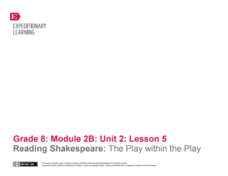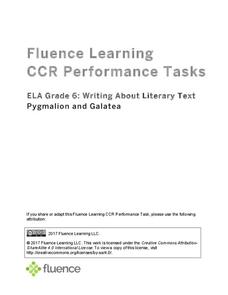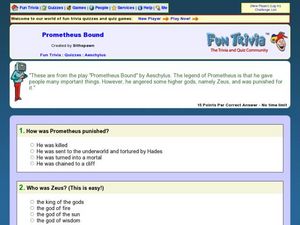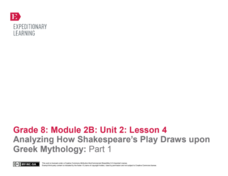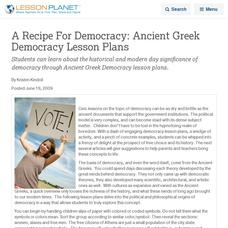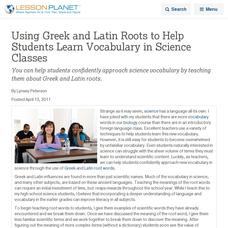EngageNY
Reading Shakespeare: The Play within the Play
Scholars continue reading the Greek myth "Pyramus and Thisbe," analyzing why it was written into Shakespeare's A Midsummer Night's Dream. Next, they complete a Venn diagram to compare the two texts.
Fluence Learning
Writing About Literary Text: Pygmalion and Galatea
Is it crazy to fall in love with your own work, or is that the purest love of all? Compare two renditions of the classic Greek myth Pygmalion and Galatea with a literary analysis exercise. After students compare the similarities and...
Curated OER
Root Words from Greek and Roman Gods' Names
Prepare a stack of index cards with a Greek or Roman god's name on one side and their description on the other. Then, use the worksheet attached to brainstorm as many words that contain the root from each card. Pupils also create their...
Jefferson Township Schools
Major Gods: Names, Roles, & Symbols
From Aphrodite to Zeus, here you'll find a PowerPoint presentation identifying basic information about 15 Greek gods and goddesses.
Curated OER
Prometheus Bound
How much do your readers know about Prometheus? After reading Aeschylus' famous play Prometheus Bound, quiz your class with these ten multiple-choice questions. This basic quiz works well for an introduction to Greek mythology.
Curated OER
Antigone
This PowerPoint begins by engaging your class in a discussion about tragedies. What is a tragedy, and what tragedies has your class experienced? Then, the typical cycle of a tragedy is explained, and the history of Greek tragedies is...
K20 LEARN
Antigone's Themes Today: The Greek Drama Antigone
Is Antigone relevant to today's readers? After reading Sophocles' tragedy, scholars must decide if the themes are universal and timeless. Class members engage in a series of activities designed to have them closely consider the...
EngageNY
Analyzing How Shakespeare’s Play Draws upon Greek Mythology: Part 1
Scholars read the story "Pyramus and Thisbe," analyzing word choice, tone, and meaning. They then try to find the gist of the story and discuss how Shakespeare used the myth in his play A Midsummer Night's Dream.
EngageNY
Analyzing How Shakespeare’s Play Draws upon Greek Mythology: Part 3
How do the narrative and play versions of the myth "Pyramus and Thisbe" affect meaning? Scholars reread Act 5, Scene 1 from Shakespeare's A Midsummer Night's Dream and compare its structure to "Pyramus and Thisbe." Next, they use a...
Curated OER
Introductory Lesson: Greece
Students get a taste of Greek culture. In this Greece lesson, students participate in activities that require them to study the religion, music, food, clothing, and history of Greece.
Curated OER
Introduction to Greek Theatre
Students create a tableau for a Greek myth. In this introduction to Greek theatre lesson, students discuss the history of Greek theatre and tableau and complete a handout. Students work in groups to choose a myth and create a...
Curated OER
Greek Mythology
In this literature worksheet, students find the terms of Greek Mythology and the answers are found by clicking the button at the bottom of the page.
Curated OER
Greek Gods and Titans
In this literature worksheet, students find the words that are related to the naming of Greek Gods. The answers are found at the bottom of the page.
Curated OER
A Recipe For Democracy: Ancient Greek Democracy Lesson Plans
Students can learn about the historical and modern day significance of democracy through Ancient Greek Democracy lesson plans.
Curated OER
Using Greek and Latin Roots to Help Students Learn Vocabulary in Science Classes
You can help students confidently approach science vocabulary by teaching them about Greek and Latin roots.
Curated OER
Greeks Puzzle
In this Greeks word search puzzle, students identify Greek names. A list of 45 words have been provided to assist students in their search.
Curated OER
The Glory That Was Greece
After finishing a unit on Greek history, it's important to test how much learners remember. This handout provides six different essay topics related to Greek History, influences, Athenian Democracy, or Alexander the Great. A rubric is...
Curated OER
Sophocles' Oedipus the King
Introduce your class to the Greek tragedy with a study of Sophocles’ Oedipus the King. Learners examine the features of a Greek tragedy, Sophocles’ achievements and contributions, and the universal themes that make the drama an...
Curated OER
Graphs of the Heart
Young scholars study Greek literature. In this Greek tragedies activity, students explore the dance-dramas of Martha Graham. Young scholars study the choreography that brings ancient Greek literature to life.
Curated OER
Mythological Word Origins
Review myths and the characters therein, connecting them to vocabulary words in the English language today. Begin by searching online for myths and character names. With at least ten names that are familiar English words, learners use...
Curated OER
Writing Exercises: The Byzantine Empire III
Three wonderful questions will help your middle schoolers better understand the Byzantine Empire. They construct short essay responses to each of the three prompts, discuss the schism between the Greek and Roman Catholic church, the...
Curated OER
Vocabulary and Concept Development
Considering a lesson on Greek and Latin roots and affixes? The Latin roots bas and pos, and the Greek root bas are the focus on a colorful, animated presentation that will engage your learners and provide guided and independent practice...
Curated OER
Latin Lingo
Did you know that the Greek and Latin root words that make up the scientific name of a creature often describe the animal? All the root words on this list relate to whales and dolphins. Learners examine the scientific names for dolphins...
Curated OER
The Legacy of Ancient Greece and Rome
Where did the inspiration for the US government system come from? From the ancient Greeks and Romans, of course. Scholars define nine terms relating to Greek and Roman government, complete a graphic organizer, and list the greatest...
Other popular searches
- Greek Myths
- Greek Mythology
- Greek Root Words
- Greek Gods
- Greek and Latin Roots
- Greek Gods and Goddesses
- Greek Drama
- Ancient Greek Democracy
- Greek Alphabet
- Greek Democracy
- Greek Culture
- Greek Theatre
